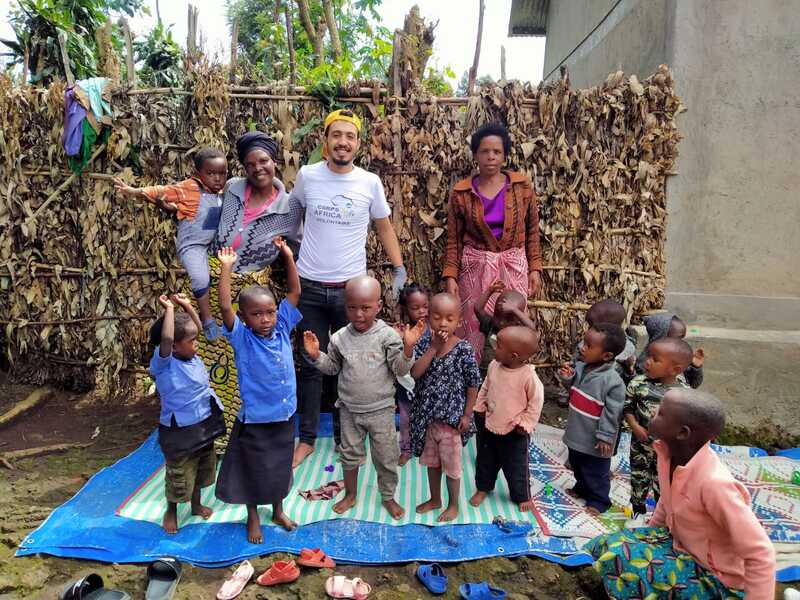Written by CorpsAfrica/Rwanda Volunteer Mr. Essaid Meria (a Moroccan Exchange Volunteer serving in Rwanda)
Strategies and programs aimed at achieving a percentage of change in the rural communities they target are often advocated by a group of international organizations active in volunteerism, which are based on the training of young people with university degrees in various disciplines. They organize multiple meetings to identify the priorities of communities, identify their needs, and research in a participatory and consensual manner on possible and sustainable solutions to their complex local needs in various sectors, such as education, health, environment, agriculture, and infrastructure.
However, the most important approaches that must be worked on for the targeted social groups are often forgotten. Then what are these approaches?
For the last sixteen months, I have been volunteering with CorpsAfrica, in Morocco as a first phase and Rwanda as a second. Besides this, my experience has shown me that CorpsAfrica has a rare type of volunteering. It has often been stated that CorpsAfrica is an organization that can an impactful and developmental work, both with volunteers and targeted village communities.
Furthermore, I want to share with you, some of the beautiful moments that I spent at the boundary of this moment with CorpsAfrica. I am drawn to this writing spirit from the daily life I lead in my site ‘’ Cyanturo village’’ where I represent CorpsAfrica/Rwanda as a Volunteer.
With CorpsAfrica/Rwanda methodology, I believe that changing the daily lives of the targeted communities will only come by changing our behaviors and social practices as Volunteers. This is what I summed up on one of the regular days when I shared my experience and information with the local population. On the day that marks Independence Day in Morocco on November 18th, I was among the days when I felt nostalgic for my country and for celebrating that day with my friends and family. However, I wanted to be an expatriate in Rwanda, where I am embarking on a new humanitarian and social venture.
On the 18th on my site, there is a weekly meeting of local people, where they discuss the most important activities they’ve worked on in the past weeks, and they propose new ideas that always have to do with moving people and doing volunteer work daily that would at least contribute to the development of their village in terms of infrastructure and hand-to-hand assistance between families.
In addition, they adopted a strategy that I find to be one of the most important contributing factors to their situation, which is a strategy of providing financial resources (saving money), where each member of the community places a certain amount of money in less than 1 dollar per individual village, and every week I find them saving more than 35 dollars or less depending on who is participating in this strategy.
There were only 14 people in attendance at this weekly event, the majority of whom were young women between the ages of 23 and 31. It is not as usual that the number of attendees is lower than it is today, as in most cases it is 30 to 50 people of different races and ages. This is because the rainfall prevented many of them from attending. The weather did not prevent them from attending, but came at the agreed time, filled with positive energy and a collective spirit that I have never seen before in such an atmosphere.
After their weekly trajectory of saving money ($25 in this time) stored for their development, I noticed that it was an appropriate opportunity to organize the most important approaches that CorpsAfrica/Rwanda was working on in identifying its geographically targeted, demographically and resourced area, among others. which is Community Mapping.
The first thing I did was to define this approach and explain its stages and importance in understanding the current state of the present group, where they first started to map the village, organize the infrastructure, the public and health facilities, and identify the houses where they live, as well as the green areas where they will be available, in a collective and consensual spirit, exchanging ideas in all respects, not in terms of drawing, using the appropriate colors for the facilities. I was amazed and learned a lot from how the community has discovered assets that it has and needs for sustainable development.
Community mapping approaches with people on my site have changed a whole bunch of everyday thoughts and practices that I have been putting out my energy on with no result. Human-Centered Design and Asset Based Community Development approaches are the keys to unlocking the community’s potential.
Finally, I think, in my opinion, the other country where CorpsAfrica is based, has to learn from the experience of CorpsAfrica/Rwanda Volunteers, and how CorpsAfrica/Rwanda is working to frame young people and make them understand the importance of changing their attitudes and practices before thinking about changing the targeted communities. So community mapping with acting means impressive development.

